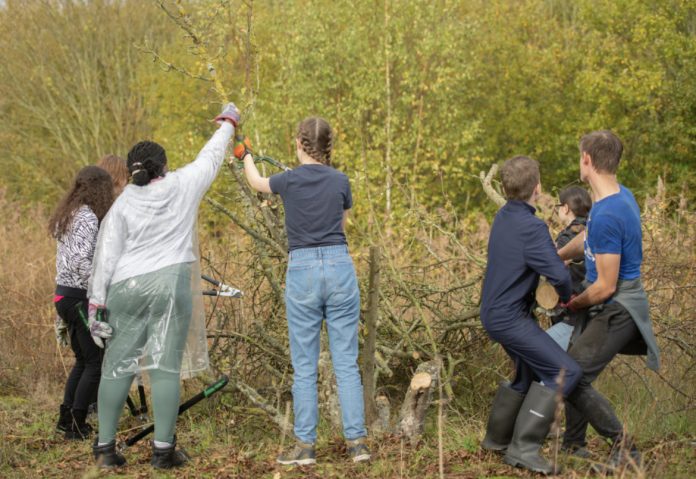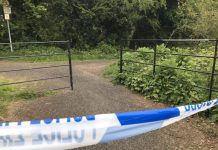Newton Heath and Platt Fields in Manchester are part of a new UK-wide initiative announced today, seeking to help local, mostly urban, communities stand up for nature in their neighbourhoods, tackling the global climate and nature crises at a local level.
It is widely known how being close to nature and green spaces is good not only for our physical health, but also for our mental wellbeing.
By announcing the Nature Neighbourhoods
initiative today – World Mental Health Day – this project aims to help more people benefit from all the advantages nature can bring, in being right on their doorstep.
Three-quarters of people in the UK are worried about the state of nature , yet we are in the bottom 10% of countries globally for protecting it
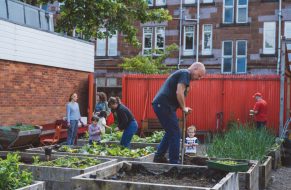
In March 2023, the People’s Plan for Nature set out recommendations to reverse the UK’s shocking declines in nature , including calls for greater investment in ways to help communities take action to protect and renew nature at a neighbourhood level.
The Nature Neighbourhoods project is a direct response to those calls.
As part of the Nature Neighbourhoods project, 18 community organisations [4] will receive support from three of the UK’s largest nature charities – WWF, the RSPB and the National Trust.
The organisations have come together as part of Save Our Wild Isles,an ongoing partnership to take action for nature’s recovery in the UK, and along with leading convenience retailer Co-op will support communities to create people-powered plans for nature in their local area.
In Manchester, Newton Heath and Platt Fields will see two established community organisations benefit from funding for this project.
Sow The City are a social enterprise focussed on repurposing derelict urban sites into attractive, useful green space, involving local communities to share skills and connect with nature.
And Manchester Urban Diggers focus on food systems, providing volunteeringopportunities and growing fruit, vegetables and herbs for local communities.
Kieron McGlasson, Director of Sow the City said,
“Newton Heath is Manchester’s most deprived ward and historically an area that has felt ignored. In 2019, Sow the City found that much of the ward is a ‘food desert’, which means there are few places to buy affordable fresh fruit and vegetables.
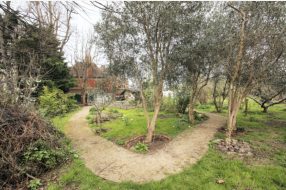
During the Covid pandemic, which obviously presented other challenges, we set to work to do something about this by focussing work on creating micro community food growing projects and supporting various households ranging from tower blocks to yards to improve the external spaces they had, including even just a balcony, to develop these for food growing, health,wildlife and nature. We were bowled over by the response of local people interested to get involved with nature and green up their spaces and community. We are therefore thrilled to be involved in this project to add momentum to this initial work and progress Newton Heath into a Nature Neighbourhood. The funding will allow us to continue to get under the skin of the community and through an assets-based approach, capitalise on the energy and enthusiasm for how nature in Newton Heath can help address some of our
most stark urban problems.”
Each Nature Neighbourhood plan will be created by bringing local communities and decision makers together to ensure each plan centres on the community’s priorities for tackling the nature and climate crises.
There will be a particular focus on working with urban communities, as while most people live in town and cities, there are often substantial barriers to accessing nature in urban environments, along with higher social and economic inequalities.
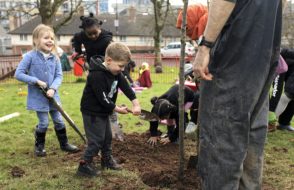
Rory Crawford, Project Manager for the Nature Neighbourhoods partnership,said,
“Urban nature doesn’t tend to be the focus of wildlife documentaries. But most of us live in urban areas, and they present the biggest opportunity for people to access and take action for nature on a day-to-day basis.
“Efforts to improve access and tackle the biodiversity and climate crises have not tended to focus on neighbourhoods experiencing high levels of deprivation, but the local community organisations involved in this project are at the forefront of addressing this, through community gardens, improving parks, connecting young people to nature, community inclusion, creating new green spaces and supporting safe, active travel.”
The national charities will work closely with local organisations such as community centres, social enterprises, and volunteer food growing collectives. These community organisations will be supported to bring together local residents, businesses and decision makers, and understand what they want and need in order to create a long-term plan for nature in their neighbourhoods.
Nature Neighbourhoods will also be given access to Co-op’s unique network of Member Pioneers, who bring people together to inspire and empower them to change the game. Member Pioneers work to tackle the big issues Co-op members and their communities care about, to connect and co-operate to create happy, healthy communities for everyone.
Nature Neighbourhoods has been funded by a £750,000 grant from The National Lottery Community Fund, the largest community funder in the UK, and £300,000 from Co-op. Thanks
to National Lottery players, Co-op’s strong reach – with a store in every postal area – and on-the-ground support from Co-op members and its Member Pioneers, the project will help 18 local partners mobilise their communities and lead positive change for natureand people through training, financial aid and collaborating with local authorities.

